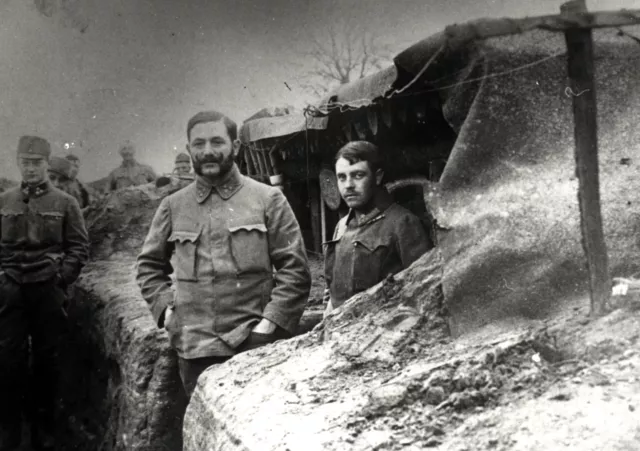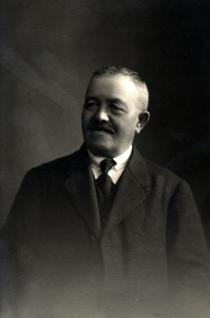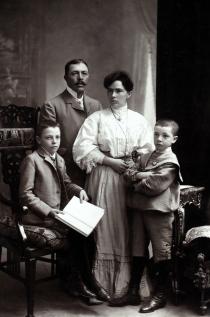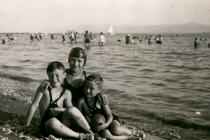This is a picture of my father Artur Simko, taken on the front when he was in the army during World War I. He is the one on the right.
My father was born in 1892 in Dolne Chlebany, a village in western Slovakia, which belonged to the Austro-Hungarian Empire at the time. He served in the army during World War I. He made a lot of good friends in the army, but many of those fine young men died on some cruel and senseless front, somewhere in Europe. My father survived, thank God.
After the war my father at first made a living as a lawyer, but this profession didn't make him very much, as a barrister he want bankrupt. And mainly because others were charging fifty crowns an hour, and he charged ten. He was also an extremely fair person. Not very suited for the world as it was back then. Well, because he didn't succeed as a lawyer, he became a judge. They then transferred him in this job from place to place. When I was 3 years old we had to move from Topolcany to Nove Zamky. So as a three-year-old I moved to Nove Zamky. But after three years we again moved. This time to Nitra. They'd transferred my father there, and our entire family, including Grandma, had to move again. In Nitra my father worked as a judicial advisor. I don't remember much from Topolcany or Nove Zamky any more. But Nitra was my entire childhood. My mother liked to dress nicely and fashionably, and I've even got photos. My father was a judge and also dressed well.
As I've mentioned, my father was already a pan-Slavist during the time of Austro-Hungary. Then after the front, after World War I, also atypical for a Jew in Topolcany, in Koruna, he founded the Slovak National Council [Slovak National Council: the name of several high-level organs of various types during the history of Slovakia. See also - Editor's note]. Koruna was the most elegant place there, a café. There were lots of Jews and Hungarians in high functions in Hungary, who were saying goodbye to Austro-Hungary and were still singing the Hungarian anthem. In the 'next room over' my father was founding the Slovak National Council. My father's entire tendency was pro-Slovak, I'd say. For example, when during the war they wanted us to save ourselves from the Holocaust in Hungary, my father was against it. That was one line. The second line was social democracy [Czechoslovak Socially Democratic Labor Party - Editor's note]. He was on good terms with the minister of justice, Deder. My father was probably the only leftist judge in the region. It wasn't usual for judges. They were all national socialists, in short they were in the 'butcher parties', they weren't in leftist parties. My father was this solo player, this black sheep. During the First Republic the Social Democrats were very active.
Arthur Simko on the front
Share
Photos from this interviewee
The Centropa Collection at USHMM
The Centropa archive has been acquired by the United States Holocaust Memorial Museum in Washington, DC.
USHMM will soon offer a Special Collections page for Centropa.
Academics please note: USHMM can provide you with original language word-for-word transcripts and high resolution photographs. All publications should be credited: "From the Centropa Collection at the United States Memorial Museum in Washington, DC". Please contact collection [at] centropa.org.




































